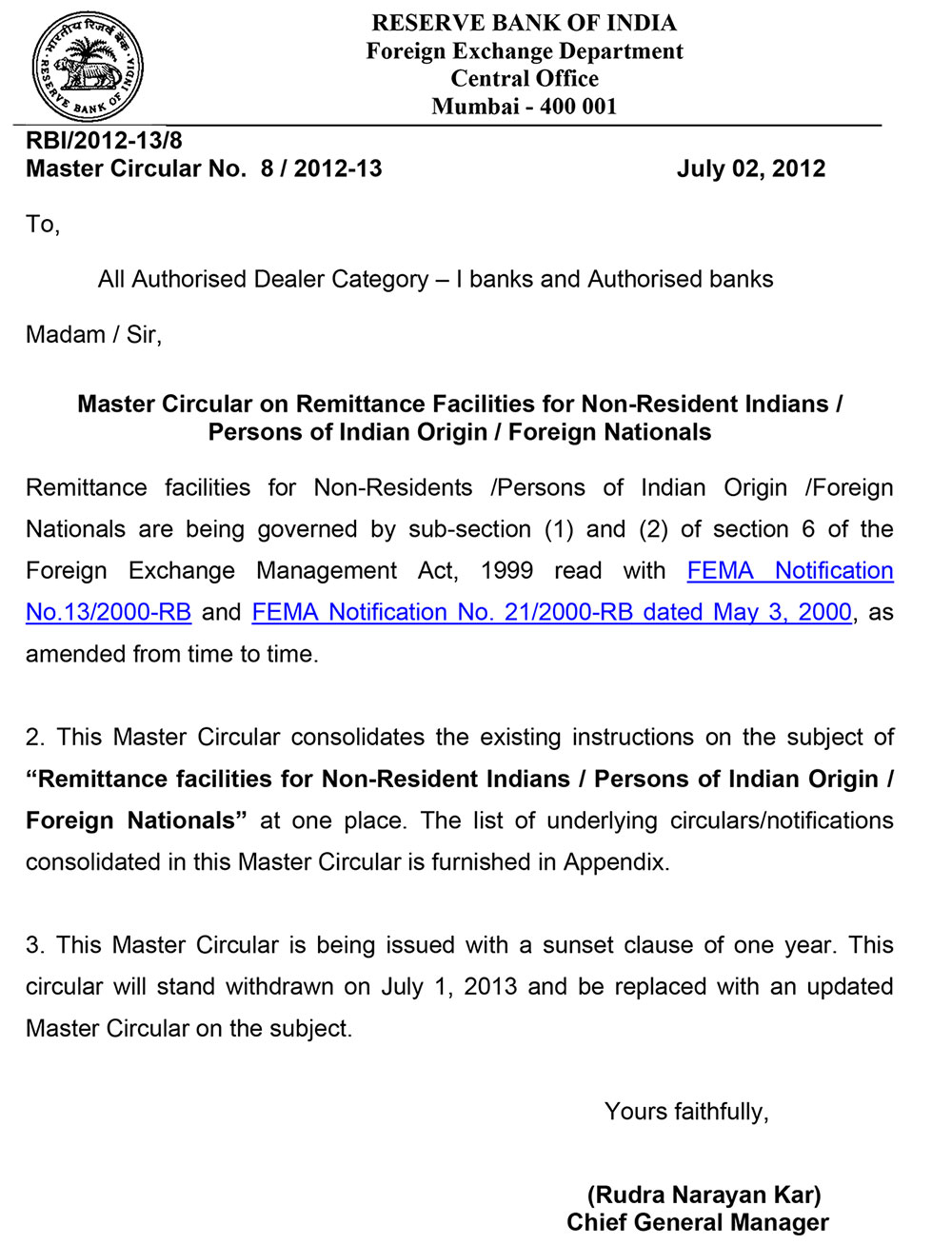a) Non-Resident (External) Rupee (NRE) Accounts (Principal/ Interest Repatriable)
- Savings The interest rates on NRE Savings deposits shall be at the rate applicable to domestic savings deposits. Currently the interest rate is 3.5%.
- Term deposits – For 1 year to 3 years, the interest rates on fresh repatriable Non-Resident (External) Rupee (NRE) Term deposits should not exceed the LIBOR/SWAP rates, as on the last working day of the previous month, for US dollar of corresponding maturity plus 50 basis points.
The interest rates as determined above for three year deposits should also be applicable in case the maturity period exceeds three years. The changes in interest rates will also apply to NRE deposits renewed after their present maturity period.
b) FCNR (B) (Principal/ Interest Repatriable) Deposits of funds in the account may be accepted in such permissible currencies as may be designated by the Reserve Bank from time to time.
- Presently the term deposit can be placed with ADs in India in 6 specific foreign currencies (US Dollar, Pound Sterling, EURO, Japanese Yen, Australian Dollar and Canadian Dollar).
- Rate of Interest - Fixed or floating within the ceiling rate of LIBOR/SWAP rates for the respective currency/corresponding term minus 25 basis points.
- Maturity of deposits: 1-5 years.
c) NRO Accounts (Current earnings repatriable)
- Savings - Normally operated for crediting rupee earnings / income such as dividends, interest. Currently the interest rate is 3.5 per cent.
- Term Deposits - Banks are free to determine interest rates.
d) Repatriation from NRO balances Authorised Dealers can allow remittance/s upto USD 1 million per financial year (April-March) for bonafide purposes, from balances in NRO accounts subject to payment of applicable taxes. The limit of USD 1 million per financial year includes sale proceeds of immovable properties held by NRIs/PIO.
- Government dated securities/treasury bills.
- Units of domestic mutual funds.
- Bonds issued by a public sector undertaking (PSU) in India.
- Non-convertible debentures of a company incorporated in India.
- Shares in Public Sector Enterprises being dis-invested by the Government of India, provided the purchase is in accordance with the terms and conditions stipulated in the notice inviting bids.
- Shares and convertible debentures of Indian companies under FDI scheme (including automatic route & FIPB).
- Shares and convertible debentures of Indian companies through stock exchange under Portfolio Investment Scheme.
- Perpetual debt instruments and debt capital instruments issued by banks in India.
- Government dated securities (other than bearer securities)/treasury bills.
- Units of domestic mutual funds.
- Units of Money Market Mutual Funds in India.
- Non-convertible debentures of a company incorporated in India.
- The capital of a firm or proprietary concern in India, not engaged in any agricultural or plantation activity or real estate business.
- Deposits with a company registered under the Companies Act, 1956 including NBFC registered with RBI, or a body corporate created under an Act of Parliament or State Legislature, a proprietorship concern or a firm out of rupee funds which do not represent inward remittances or transfer from NRE/FCNR(B) Accounts into the NRO Account.
- Commercial Paper issued by an Indian company.
- Shares and convertible debentures of Indian companies other than under Portfolio Investment Scheme.
- May acquire immovable property in India other than agricultural land/ plantation property or a farm house out of repatriable and non-repatriable funds.
- May acquire immovable property in India other than agricultural land/ plantation property or a farm house out of repatriable and non-repatriable funds..
- Sale proceeds of immovable property acquired in India to the extent of repatriable funds used for acquiring the property, up to two residential properties. The balance will be repatriable through NRO Account subject to conditions mentioned at item (I) (d)..
- Refund of (a) application / earnest money / purchase consideration made by house-building agencies/seller on account of non-allotment of flats / plots and (b) cancellation of booking/deals for purchase of residential/commercial properties, together with interest, net of taxes, provided original payment is made out of NRE/FCNR(B) account/inward remittances.
- Housing Loan in rupees availed of by NRIs from ADs / Housing Financial Institutions can be repaid by the close relatives in India of the borrower.
- May continue to hold, own, transfer or invest in foreign currency, foreign security or any immovable property situated outside India, if such currency, security or property was acquired, held or owned when resident outside India.
- May open, hold and maintain with an authorised dealer in India a Resident Foreign Currency (RFC) Account to transfer balances held in NRE/FCNR(B) accounts. Proceeds of assets held outside India at the time of return, can be credited to RFC account. The funds in RFC accounts are free from all restrictions regarding utilisation of foreign currency balances including any restriction on investment in any form outside India.










